As many of you know, I love history, no matter whether it's ancient history, world history, American history, recent history or current events. As Fox News says,"Before its history, its news."
On Sunday morning, I was actually fortunate to not be able to sleep. No matter what religion you practice, history was made at 4 AM EDT and those of us, who could not sleep in this country, were witnesses to history being made in Italy; more specifically, in Vatican City.
Over 300,000 people, including dignitaries from many countries, along with representatives from every major faith were crowded in St Peter's Square to bear witness. According to reporters on the scene, there were also over half million people crowded in the streets and piazzas outside the square, just to say they bore witness to history.
Generally, the Roman Catholic Church will canonize an individual as a saint and while it is a big deal to the Church, the population at large is not really affected by the event. Sometimes, the newly canonized saint may have been a person from a century or more in the past.
Sunday was different though. Two beatified individuals were elevated to sainthood. If you were born before June 3, 1963, you lived when they lived. Even if you were a newborn or toddler, your life, especially as a Catholic, was affected by pronouncements and decisions made by both these men. If you actually met or saw either of them, you were touched and looked upon by a saint. Incredible.
St John XIII was elected pope in 1958, most probably, due to his advanced age, as a caretaker. Most cognoscenti felt he wouldn't live long and do anything to affect the direction of the Church. Instead, in late 1961, he announced that he was calling an Ecumenical Council, called Vatican II, to "open the windows and let out the stale air." The council went from 1962 to 1965, but he died in 1963 before it was completed, two months after he published his encyclical, Pacem in Terris. Call him The Originator.
St John Paul II was elected Pope in October, 1978 following the deaths of John's successor Paul VI, the Implementer, and John Paul I, who died mysteriously 33 days after his election. John Paul II was the second longest serving pope in history and like John Paul I, took his name to honor the two popes who directed the church through the council and its early years. St John Paul carried the church through the many changes initiated by Vatican II, some popular, some not so much, until he died in 2005. Call him The Interpreter.
It is fitting that The Originator and The Interpreter would be canonized together. While some saints share a Feast Day, never before did the Church intentionally canonize two saints on the same day, with two living popes completing the service. But there is a special affinity between these two men that many may not see. While Paul VI may have implemented the wishes of Vatican II, the changes he made were really of no consequence. Instead John Paul II truly understood the intent of what John XXIII wanted to do with the Church.
One man wanted to include others, Greek and Russian Orthodox, Coptics, Protestants (all denominations), Jews, Muslims and other faiths, in making mankind better by working more on issues all religions had in common, and downplaying the differences. The other man went to virtually every country in the world to carry the message of unity and fraternity. Along the way, his message was understood in Eastern Europe and Russia, where by 1991, the shackles of communism were removed.
The Ecumenical Council was implemented to bring Christendom together and promote a worldwide influence of Christian and other religious teachings. To a degree, while some will disagree, this mission has largely been accomplished. Pope Francis believes it is a work in progress. It certainly has influenced our thinking about our religions over the last 50 years. In essence, the Church is in a state of flux, which may not be a bad thing.
John XXIII wanted to open the windows. John Paul II did and washed them, too. The Church still has far to go, but as JFK said, "Let us begin." It has taken over 50 years to get here, but that is alright. The Church has always been slow to accept change; but more change has happened since John XXIII became pope than in the 500 years before him.
So, forevermore April 27 will always be the Feast Day of Saints John XXIII and John Paul II. We were alive to see the first one and hope to be alive for many more. The influence of these two men on our view of the 20th Century will be measured by an Encyclical about Peace on Earth and how well it was achieved.
That is the history of our newest saints, two men who by themselves did some, but together did so much.

No comments:
Post a Comment